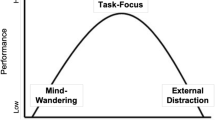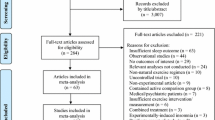Abstract
Marked sleepiness occurs during typical night shift work hours and this reduced alertness is associated with marked performance deficits. The effect of caffeine (versus placebo) upon sleepiness at night was studied using objective measures of physiological sleep tendency and ability to sustain wakefulness. Both measures show caffeine to reduce sleepiness at a single dose roughly the equivalent of two to four cups of coffee. Despite impressive objective differences in alertness with caffeine, subjects did not consistently differentiate between drug conditions on subjective alertness assessments. The use of CNS stimulants to promote alertness during night shift hours should be considered, particularly for occupations for which alertness is critical.
Similar content being viewed by others
References
Borland RG, Rogers AS, Nicholson AN, Pascoe PA, Spencer MB (1986) Performance overnight in shiftworkers operating a dognight schedule. Aviat Space Environ Med 57:241–249
Carskadon MA, Dement WC, Mitler MM, Roth T, Westbrook PR, Keenan S (1986) Guidelines for the multiple sleep latency test (MSLT): a standard measure of sleepiness. Sleep 9:519–524
Daly JW, Bruns RF, Snyder SH (1981) Adenosive receptors in the central nervous system: relationship to the central actions of methylxanthines. Life Sci 28:2083–2097
Hartse KM, Roth T, Zorick FJ (1982) Daytime sleepiness and daytime wakefulness: the effect of instruction. Sleep 5:S107–118
Hoddes E, Zarcone V, Smythe H, Phillips R, Dement WC (1973) Quantification of sleepiness: a new approach. Psychophysiology 10:431–436
Lumley M, Roehrs T, Asker D, Zorick F, Roth T (1987) Ethanol and caffeine effects on daytime sleepiness/alertness. Sleep 10:306–312
Mitler MM, Carskadon MA, Czeisler CA, Dement WC, Dinges DF, Graeber RC (1988) Catastrophes, sleep, and public policy: Concensus Report. Sleep 11:100–109
Nicholson AN, Pascoe PA (1988) Studies on the modulation of the sleep-wakefulness continuum in man by fluoxetine, a 5-HT uptake inhibitor. Neuropharmacology 27:597–602
Nicholson AN, Stone BM (1980) Heterocyclic amphetamine derivatives and caffeine on sleep in man. Br J Clin Pharmacol 9:195–203
Richardson GS, Carskadon MA, Oran EJ, Dement WC (1982) Circadian variation of sleep tendency in elderly and young adult subjects. Sleep [Suppl 2] 5:S82-S94
Sugerman JL, Walsh JK (1989) Physiological sleep tendency and ability to maintain alertness at night. Sleep 12:106–112
Author information
Authors and Affiliations
Rights and permissions
About this article
Cite this article
Walsh, J.K., Muehlbach, M.J., Humm, T.M. et al. Effect of caffeine on physiological sleep tendency and ability to sustain wakefulness at night. Psychopharmacology 101, 271–273 (1990). https://doi.org/10.1007/BF02244139
Issue Date:
DOI: https://doi.org/10.1007/BF02244139




